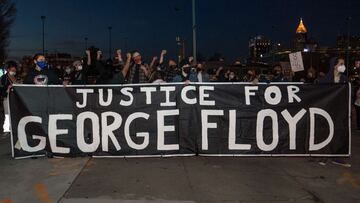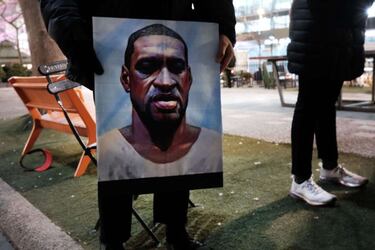Trial to begin on the death of George Floyd: what can happen?
Former Minneapolis police officer Derek Chauvin is due for trial for the death of George Floyd with the judge reconsidering adding an additional murder charge.

The judge in the trial of former Minneapolis police officer Derek Chauvin for the death of George Floyd was contended with a last-minute order by a higher court, thus delaying its start until at least Tuesday morning. He is reconsidering adding an additional murder charge.
George Floyd: the trial to begin against Derek Chauvin
The trial had been scheduled to begin on Monday with the screening of jurors to weigh murder and manslaughter charges in a case seen as a referendum on police violence against Black Americans. Chauvin appeared in court dressed in a navy blue suit and tie, a white shirt and a black face mask, jotting notes in a yellow legal pad on the table before him.
Judge Peter Cahill of the Hennepin County district court set aside three weeks for jury selection alone, mindful of the difficulties finding impartial Minneapolitans in a case that has convulsed a nation and in which an image of the victim - a selfie of Floyd faintly smiling - has become an international icon of racial justice.
- What did Joe Biden say about the "defund the police" message?
- Former Minnesota police officer charged with the murder of George Floyd released on bail
- What is ‘wanton endangerment’ in the first degree?
- George Floyd: officer bodycam transcripts - "You're going to kill me"
But that was delayed by the Minnesota Court of Appeals, which ordered Cahill to reconsider prosecutors' request to also reinstate a third charge, third-degree murder, over the defendant's objections.
Chauvin legal team looking to overturn order
Eric Nelson, Chauvin's lead lawyer, told the court on Monday morning that Chauvin would soon ask the Minnesota Supreme Court to overturn Friday's order, a process that could take weeks. Prosecutors from the Minnesota attorney general's office urged the court to delay jury selection until that issue was resolved.
"We're not doing this to interfere, to slow this down, but it is a very important matter," Matthew Frank, an assistant attorney general, told the court. Prosecutors feared picking a jury when the number of charges was still unresolved could make it easier for Chauvin to appeal a verdict later, Frank said.

Cahill declined. Prosecutors then said they would ask the Appeals Court to intervene to delay the trial. Cahill suspended jury selection until at least Tuesday.
George Floyd case: what can happen?
Chauvin, 44, is charged with second-degree murder, which carries a sentence of up to 40 years in prison, and manslaughter.
Chauvin was released from jail on a $1 million bond last October and will be tried in a courtroom in the Hennepin County Government Center, a tower in downtown Minneapolis now ringed with fencing and concrete barricades for fear of disruption by protesters.
Small groups of protesters gathered by the barricades at an
adjoining park, some arriving with bouquets of flowers and signs daubed with optimistic slogans: "A change is coming." A few volunteers set up tables, handing out donated coffee and donuts.
The courtroom has been adapted to mitigate the spread of the novel coronavirus, and Judge Peter Cahill has sharply limited attendance inside: the families of Chauvin and Floyd have each been allocated a single seat inside the courtroom. Bridgett Floyd, George Floyd's sister and founder of the George Floyd Memorial Foundation, went inside for the first day, according to a pool reporter inside the courtroom. Most reporters attending must watch a video stream in a building across the street.
#DerekChauvin is on trial. #DerekChauvin is on trial. #DerekChauvin is on trial. #DerekChauvin is on trial. #DerekChauvin is on trial. #DerekChauvin is on trial.
— Be A King (@BerniceKing) March 9, 2021
Not George Floyd.
Related stories
Lawyers for Chauvin, who was fired from the police force the day after Floyd's death, have argued that he correctly followed his training in helping colleagues arrest Floyd on suspicion of using a counterfeit $20 bill at the Cup Foods grocery store. A handcuffed Floyd can be seen in videos struggling against being placed in a police vehicle complaining he has claustrophobia.
The medical examiner ruled that Floyd's death was a homicide caused partly by police restraint holds. But the autopsy report also noted that Floyd had recently ingested the opioid fentanyl, and Chauvin's lawyers contend that an overdose was the main cause of death.

